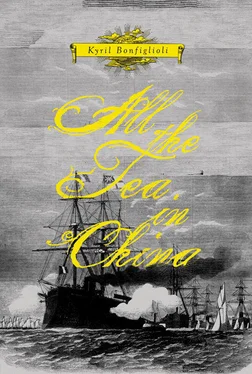I boggled at this: I could not understand its relevance to our perilous state. His arm remained upon my shoulder in an avuncular fashion.
“First,” he continued, “a slice or two of delicious cold tongue will do you a power of good, d’you see. Second, to break out one of your delicious cold tongues and share it with your mess-mate would be a generous, comradely action. Third, since we are about to sink into the cold abyss of the sea …”
“Oh, shut up,” I said. “You are pulling my leg because I am but a poor foreigner. You are a five-letter man, Peter.”
“Four,” he said, diffidently.
“I meant four. And I happen to know that you have some sweet pickles in your dunnage …”
“True!” he cried happily. “What’s more, I have the crusty bottom of a loaf inside my shirt, still hot from the galley, and, under my bunk, unless unscrupulous people have purloined them, there is a crock of butter and a pot of mustard.”
“Then what the damnation are we standing here for, arguing and quaking with cold and wet?”
“Hold on to me Karli; I shall lead the way.”
No one, in the face of Peter’s good humour and careless courage, could have been so base as to fear the elements. At every instant there was sure evidence — at least, so it seemed to me — that our little craft — it seemed very little now amidst those monstrous seas — had not the least chance of living through the storm but I was shamed out of all cowardice by Peter’s pleasant teasing whenever he ducked into the cabin for dry clothes and by the child-like way he fell asleep between watches. Indeed, the very fact that he had spells between watches at all was a sort of comfort: with the ship being shaken about like dice in a cup to the incessant bellowing of the gale and the crash of seas I should have thought that every able officer and man would have been on deck, shouting useful orders or pulling at ropes or making promises to his Maker. That men could be spared from the horrors of the deck and that, when so spared, they could fold their hands in sleep was to me both a marvel and a reassurance.
Clearly, such weather could not continue: there was not enough wind on the globe nor enough rain in the firmament to sustain such savagery for many hours. I was wrong; the fury continued unabated until even I lost my fear of it and contrived to wash and shave and shift my under-linen, toppling about the cabin like a drunken man. Little Orace staggered in manfully from time to time, his face drawn and green, bearing a kid of cold food (for of course the galley fire was still dowsed) and taking away my clothes for washing. His courage helped to make an Englishman of me for the time being: it was not so much that I was loath to disgrace myself in front of him, more that I did not wish to make him unhappy at having an unworthy master. What irrational people we English are, to be sure. Perhaps you, who were born here, have not observed this but to me, born amongst the sensible Dutch canals, it is sharply apparent.
Our skirting of the Bay took an inordinate time because, as I have said, we durst not go about on the port tack and were constrained to sail close-hauled — the yards braced up, the sheets well home and the bowlines bowsed down so taut that they squealed. (This last, Peter explained, was to stop the sails shivering. I was too proud to ask him for a similar remedy for me.)
After an eternity — perhaps seventy-two hours — I awoke one morning to find that the ship was only rolling and yawing in a way which I might have thought alarming a week before but which was now no more than pleasantly lulling.
“Come along, Karli!” cried Peter, his eyes red and squinting with fatigue, “we are weathering Finisterre, and a deuced fine landfall the Captain has made, I must say, although a little close for comfort — a mere couple of cables from the breakers.”
I closed my eyes.
“Tell me when we are clear of these breakers,” I said. “It seems to me that the perils of the sea do not improve upon acquaintance. This Finisterre is just another Ushant, is it not?”
“Yes, Karli. But in Spain. It is of little interest, I agree.”
“Good,” I said.
“Of course,” he added, “when I call you again, after we are clear of the breakers, there will be no breakfast left. The Doctor has had the galley fire alight for two hours now and he will be disappointed that you would not try his kedgeree: he prides himself upon it. But it is only a savoury mess of rice and little fragments of smoked haddock and onions and such stuff, made aromatic with his kari-sauce such as is famed all over the seven seas …”
“Peter, your blandishments do not move me at all. I am not one of those who live for their bellies.”
“No, Karli.”
“On the other hand, it is important that I should not affront the Doctor, wouldn’t you say?”
“Yes, Karli.”
“Then I shall make the sacrifice and pretend to own an appetite. For his sake and yours.”
“What a splendid chap you are, to be sure.”
I threw a book at him and, while I was laughing, he popped a slippery cake of soap into my open mouth.
Kedgeree is very good. I reserved some for later on in the morning, to ascertain whether it is also good when cold.
It is also very good when cold.
Venturing upon deck in the mid-morning, to take the air and aid digestion, I encountered the First Mate, Lubbock.
“Good morning, Mister,” I cried airily. He stepped very close to me, I could smell the rank sweat of him.
“Only a Captain calls a First Officer ‘Mister’,” he snarled. “Nasty little snot-nosed lubbers of supercargoes call me ‘Sir’ or by the great horned toad I chew them up and spit out their gristly bits — if any.”
I had a decision to make. With an effort I met his eyes; studied the gravy-coloured whites of them.
“Thankyou, Mr Lubbock,” I said at last. “It is a fine morning, is it not?” I was ready to jump over the side if necessary, but I do not think that he recognised this. He, too, made a decision and an effort; decided to be jocular.
“Well,” he said, “bully for you to make the deck: thought the sea-sickness had turned you clear inside-out; haven’t heard the dad-blamed ship’s bell for days on account of your retching and puking.” I let that pass; it might have been an American sort of joke. Moreover, it became necessary for him at just that moment to rave and bellow at a number of seamen who were heaving at a fall — which is a kind of a rope — so I had ample time to prepare a rejoinder. He turned towards me again, affecting surprise to see me still there.
“Where are we?” I asked civilly, “Mr Lubbock?” He glared at first, then studied me intently. His small brain, I think, was puzzling out what to say to me. In the end, what he decided to say was “We are scudding south along the coast of Portugal, Mister Van Cleef. Jest as soon as the wind backs a little more we’ll likely lay a course for the Grand Canary. That’s an island, Mr Van Cleef; off the coast of Africky — belongs to the Portu-geeses.” He broke off to roar dirty words at a small gang of seamen who were trying to snub a little more of a brace: they did not seem to mind, nor indeed to pay much attention, for they were intent upon their work and had ears only for their boatswain, a cheery fellow who knew just how much they could do and would press them no further.
“Thankyou, Sir,” I said, for I was curious as to what he would think of this gratuitous form of address. He glared at me suspiciously: I gazed back amicably.
“You’re welcome,” he said, turning on his heel.
The weather ameliorated: before I was prepared for it we were entering the skirts of the Tropics; each hour of southward sailing seemed to call for the shedding of another article of clothing. Had it not been for the irksome presence of Lubbock, my worries about the Captain’s sanity, and the fretful lust which Blanche’s occasional appearances evoked in me, I swear I would have been as happy a man as my kind, careless, poxy Peter Stevenage. Only thrice a day did my horizons clear, for the Doctor’s skill and invention did not abate: each succeeding meal was a new, often bizarre, delight and, in the interims, one could always be sure that there was a “tabnab” to be had in the galley for any poor, perished, half-drowned seaman or any supernumerary officer who had had the foresight to give the Doctor a half-sovereign. These “tabnabs” were little gullet-tickling confections which the Doctor threw together when he was doing nothing else, for it was not in his nature to refrain from cooking, it was his very life, nor could he bear to waste any little oddments of food. Furthermore, he was full of concern and compassion for us all, ever concerned to make us fat and contented. He was, in a way, somewhat like my mother. My favourite “tabnab” was, without question, a little fried potato-cake with a morsel of kari’d mutton inside or perhaps a tasty scrap of cod’s sound. Sometimes, too, he would fill one’s pocket with small, folded-over pieces of pastry, filled with all manner of things, so that, munching at random, one might make a surprising, Lilliputian luncheon of marmalade, then chicken, then apple and finally fish: each course but a mouthful, each mouthful a delightful shock to the palate. Although I have never allowed myself to become preoccupied with food and drink, I must confess that the Doctor’s ministrations helped me to while away the time and forget the perils of the deep.
Читать дальше












